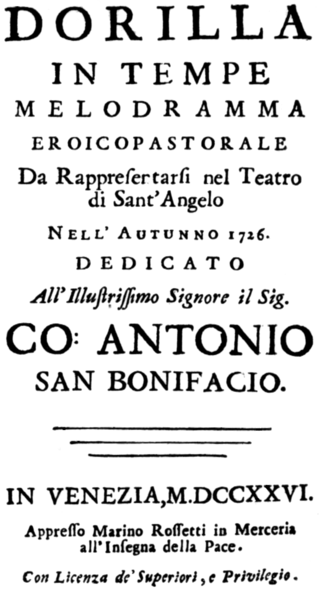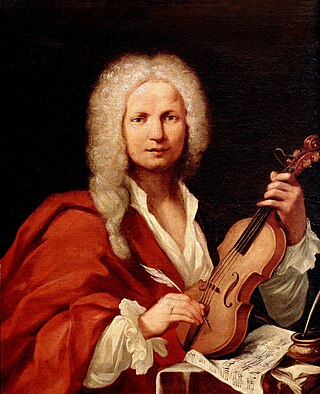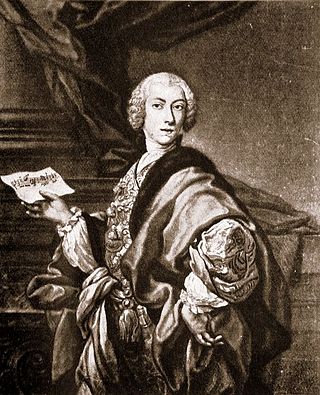
Pietro Antonio Domenico Trapassi, better known by his pseudonym of Pietro Metastasio, was an Italian poet and librettist, considered the most important writer of opera seria libretti.

L'Olimpiade is an opera libretto in three acts by Metastasio originally written for an operatic setting by Antonio Caldara of 1733. Metastasio’s plot vaguely draws upon the narrative of "The Trial of the Suitors" provided from Book 6 of The Histories of Herodotus, which had previously been the base for Apostolo Zeno's libretto Gli inganni felici (1695). The story, set in Ancient Greece at the time of the Olympic Games, is about amorous rivalry and characters' taking places to gain the loved one. The story ends with the announcement of two marriages.
Demofonte is an opera seria libretto by Metastasio. The libretto was first set by Antonio Caldara in 1733, but remained popular throughout the eighteenth century and was set over seventy times.

Griselda is a dramma per musica in three acts that was composed by Antonio Vivaldi. The opera uses a revised version of the 1701 Italian libretto by Apostolo Zeno that was based on Giovanni Boccaccio's The Decameron. The celebrated Venetian playwright Carlo Goldoni was hired to adapt the libretto for Vivaldi. The opera was first performed in Venice at the Teatro San Samuele on 18 May 1735.

Dorilla in Tempe is a melodramma eroico pastorale or opera in three acts by composer Antonio Vivaldi with an Italian libretto by Antonio Maria Lucchini. The opera premiered at the Teatro San Angelo in Venice on 9 November 1726. Vivaldi later revised the opera numerous times for several different performances throughout the second half of his career.

Giuseppe Maria Orlandini was an Italian baroque composer particularly known for his more than 40 operas and intermezzos. Highly regarded by music historians of his day like Francesco Saverio Quadrio, Jean-Benjamin de La Borde and Charles Burney, Orlandini, along with Vivaldi, is considered one of the major creators of the new style of opera that dominated the second decade of the 18th century.
Gennaro Astarita was an Italian composer, mainly of operas. The place of his birth is unknown, although he was active in Naples for many years. He began his operatic career in 1765, collaborating with Niccolò Piccinni in the writing of the opera L'orfana insidiata. He became the maestro di cappella in Naples in 1770.
Rinaldo di (da) Capua was an Italian composer. Little is known of him with any certainty, including his name, although he was known to Charles Burney. He may have been the father of composer Marcello Bernardini.

Didone abbandonata was an opera in three acts composed by Tomaso Albinoni. Albinoni's music was set to Pietro Metastasio's libretto, Didone abbandonata, which was in turn based on the story of Dido and Aeneas from the fourth book of Virgil's Aeneid. The opera premiered on 26 December 1724 at the Teatro San Cassiano in Venice and was the first time that an opera based on a Metastasio libretto was performed in Venice.
Andrea Adolfati was an Italian composer who is particularly remembered for his output of opera serias. His works are generally conventional and stylistically similar to the operas of his teacher Baldassare Galuppi. Although his music largely followed the fashion of his time, he did compose two tunes with unusual time signatures for his day: an air in 5
4 meter and another in 7
4 meter.

La Silvia is an dramma pastorale per musica in three acts by Antonio Vivaldi to an Italian libretto by Enrico Bissari. It was first performed on 28 August 1721 at the Teatro Regio Ducale in Milan on the occasion of the birthday celebrations of the Austrian Empress Elisabeth Christine, wife of Emperor Charles VI of Austria.

L'Olimpiade is an 18th-century Italian opera in 3 acts by the Czech composer Josef Mysliveček. It was composed to a libretto by the Italian poet Metastasio that was first performed in 1733. For a performance in the 1770s, it would only be expected that a libretto of such age would be abbreviated and altered to suit contemporary operatic taste; some of the original aria texts would be omitted or substituted, and the remaining aria texts would be set more expansively. In this case, only 14 of the original 18 aria texts of Metastasio were newly set to music. The cuts and changes in the text made for the 1778 performance of Mysliveček's opera are not attributable.

Teatro San Samuele was an opera house and theatre located at the Rio del Duca, between Campo San Samuele and Campo Santo Stefano, in Venice. One of several important theatres built in that city by the Grimani family, the theatre opened in 1656 and operated continuously until a fire destroyed the theatre in 1747. A new structure was built and opened in 1748, but financial difficulties forced the theatre to close and be sold in 1770. The theatre remained active until 1807 when it was shut down by Napoleonic decree. It reopened in 1815 and was later acquired by impresario Giuseppe Camploy in 1819. In 1853 the theatre was renamed the Teatro Camploy. Upon Camploy's death in 1889, the theatre was bequeathed to the City of Verona. The Venice City Council in turn bought the theatre and demolished it in 1894.

Sebastiano Biancardi, known by the pseudonym Domenico Lalli, was an Italian poet and librettist. Amongst the many libretti he produced, largely for the opera houses of Venice, were those for Vivaldi's Ottone in villa and Alessandro Scarlatti's Tigrane. A member of the Accademia degli Arcadi, he also wrote under his arcadian name "Ortanio". Lalli was born and raised in Naples as the adopted son of Fulvio Caracciolo but fled the city after being implicated in a bank fraud. After two years wandering about Italy in the company of Emanuele d'Astorga, he settled in Venice in 1710 and worked as the "house poet" of the Grimani family's theatres for the rest of his career. In addition to his stage works, Lalli published several volumes of poetry and a collection of biographies of the kings of Naples. He died in Venice at the age of 62.

Artaserse is an opera in three acts composed by Johann Adolph Hasse to an Italian libretto adapted from that by Metastasio by Giovanni Boldini first shown in Venice on 11 February 1730. Artaserse received its modern day premiere by Ensemble Serse in London on 7 November 2009.

L'Olimpiade is an opera in the form of a dramma per musica in three acts by the Italian composer Giovanni Battista Pergolesi. Pergolesi took the text, with a few modifications, from the libretto of the same name by Pietro Metastasio. The opera first appeared during the Carnival season of 1735 at the Teatro Tordinona in Rome and "came to be probably the most admired" of the more than 50 musical settings of Metastasio’s drama.
Antonio Boroni was an Italian composer.

For Giovanni Battista Pergolesi's L'Olimpiade, see L'Olimpiade (Pergolesi)
Achille in Sciro is an opera and libretto by Pietro Metastasio telling the story of Achilles on Skyros. It was first set to music by Antonio Caldara in 1736, and premiered at the wedding of Maria Theresa and Francis of Lorraine in Vienna. In 1772, Johann Anton Koch translated the libretto to German under the name "Achilles in Scyro".













